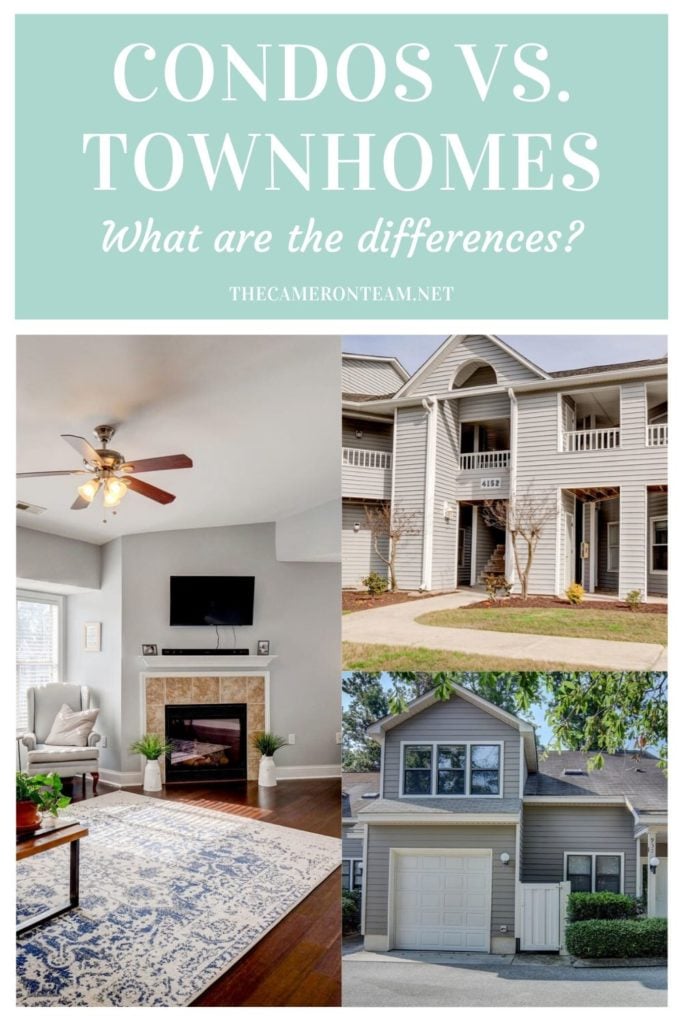Whether you’re looking to make your first real estate purchase, downsize, or snag a property at the beach, you may notice that condos and townhomes offer similar living situations. They’re both types of attached dwelling units that offer lower maintenance options than single-family detached homes. However, ownership across the two can look quite different, and we are here to break it all down for you.
What is a Condo?
A condo (or condominium) is a dwelling unit located within a larger building consisting of other similar units. Traditionally, they share walls, floors, and ceilings, depending on where the unit is in the building. But, sometimes, the building is designed to only be single story, so units are not stacked on top of one another. Condos are physically similar to apartments, except condos belong to private owners while apartments are usually rented out and managed by a landlord.
Additionally, the condo building may be part of a complex with multiple buildings on the same plot of land or in the same vicinity. Condo communities at our local beaches are sometimes divided by main roadways, so they may not look connected by passersby. Nevertheless, they’re still governed by the community’s regulations.
What is a Townhome?
Townhomes (or townhouses) are dwelling units that share 1 or 2 walls depending on their placement but do not have units above or below. They have their own front and back entrances, and may be 1, 2, or even 3 stories tall. “Townhome” is often used interchangeably with “row house”, which has varying definitions depending on where you live in the United States. Townhomes usually include some form of outdoor space, if it’s a fenced courtyard or a patio with a grassy area. A townhome may also have an attached garage.
How are Condos and Townhomes Different?
The difference between condos and townhomes falls upon legal ownership. Condo owners own whatever is inside their unit. This may be defined as ‘all-in’ or ‘bare-walls-in’, the specifics of which are defined within the building’s (or community’s) Covenants, Conditions & Restrictions (CC&Rs). The exterior of the building, amenities, and common areas are all owned by the condo owners’ association (sometimes called a homeowners’ association).
Townhome owners own the interior and exterior of their units but not the common areas or amenities. They are responsible for all upkeep and maintenance, unless otherwise noted in the community’s CC&Rs (one of these exceptions may be a shared roof). While a condo purchase does not include land, a townhome purchase does, as ownership begins at the dirt below the unit. Overall, a townhome feels more like a traditional home, has fewer regulations, and provides a stronger sense of privacy than condos.
How are Condos and Townhomes Similar?
Condo and townhome communities have owners’ associations that govern the maintenance of common areas and amenities. Condo owners’ associations on average have higher fees, because they handle the exterior maintenance of all the buildings, while townhome owners shoulder those responsibilities. Of course, the variation in price depends on location, condition, and amenities that are included in the community.
Both types of communities have similar amenities that are usually offered. In North Carolina, swimming pools, fitness centers, picnic areas, and dog runs are popular. While condo associations always handle maintenance of common areas in the community, it’s not unheard of for a townhome owners’ association to provide lawn maintenance to maintain the overall look and feel of the community.
Condos and townhomes are often covered by two insurance policies – a master insurance policy and an owner insurance policy. The master insurance policy is owned by the owners’ association and covers liability and damage in all common areas and amenities, if they exist. For condo associations, that includes the building’s exterior and access areas (staircases, elevators, breezeways, etc.), and, depending on the details of ownership, can extend to the structure or the bare walls, floors, and ceilings of the unit (the owner is responsible for cabinets, carpeting, fixtures, etc.). For townhome communities, roofs may be included, because shared roofs can be complicated to fix and replace. Having that responsibility fall under the owners’ association creates a clear outline of responsibility.
Which Should You Choose?
Both condos and townhomes require less maintenance than a traditional single-family home; however, condos require the least maintenance of the two. Condos are significantly cheaper to purchase, even though the owners’ association fees run higher. But if you’d like more control over the property and have an outdoor space to call your own, a townhome is worth the higher price.
If you’re thinking of buying a condo or townhome in the greater Wilmington area, give us a call at (910) 202-2546. We can help you throughout the buying process, from finding the perfect unit to negotiations to inspections to closing day details. We’ve got you covered!
[the_grid name=”Home Buyer Tips”]




